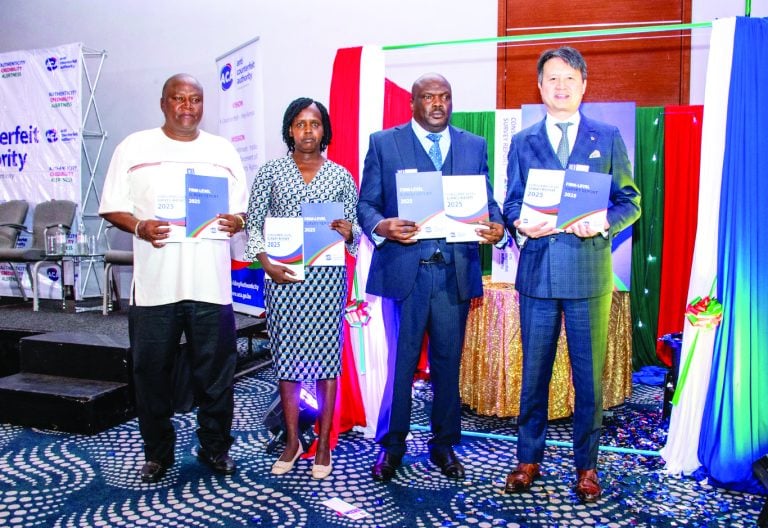Counterfeit products trade is at an all-time high, report reveals
By Cynthia Atuo, June 9, 2025Trade in counterfeit goods in Kenya is on the rise, making it one of the fastest-growing illicit industries globally.
A new Consumer-Level Report by the Anti-Counterfeit Authority (ACA) has revealed that 20 per cent of products in Kenya are counterfeit, leading to an annual loss of Ksh800 billion.
This loss represents nine per cent of the entire illegal trade.
“On average, 18 per cent of products in Kenya are counterfeit, and the majority, that is 53 per cent of respondents, noted increased counterfeit incidents over the past year,” the report states in part.
As a result, the country’s manufacturing sector is under threat, with the automotive spare parts being the worst hit, as 39 per cent of products in the sector are illegal.
The energy, electronics and electrical sector follows suit with 27 per cent of counterfeit products, followed by alcoholic beverages at 19 per cent and pharmaceutical medical equipment at 15 per cent.
Fake drinks
Alcohol, which is highly consumed, recorded a high number of counterfeit drinks, with gin, vodka, spirits and wine being the most common counterfeit beverages.
Speaking during the World Anti-Counterfeit Day on June 6 2025, ACA Executive Director Robi Njoroge noted that illegal goods are a major threat not only to the economy but to public safety as well, since most of them are of low quality and potentially hazardous.
“Counterfeit is not just a theft, it is a public health crisis, a barrier to industrial growth and a direct threat to investor confidence,” Njoroge said.
And even as the country continues to fight against counterfeit products, it has also emerged that firms and consumers are aware of illegal goods.
Notably, 71 per cent of firms surveyed acknowledged that they were aware of counterfeit products in the sector.
A significant increase in the level of awareness in the sector compared to 30 per cent in 2020.
At the same time, 65.48 per cent of consumers who are largely buyers said they are aware of the existence of illicit goods.
Busia county had the highest awareness level, standing at 98 per cent, followed by Garissa, Kisumu, Machakos, and Mombasa, respectively.
The findings further reveal that while kiosks and street vendors are the leading source of counterfeit goods, with 60 per cent buying from them, online parts are also catalysing the illicit industry, representing 31 per cent of illicit sales in the last 12 months.
Jumia was identified as the leading online platform where many Kenyans purchase illicit products, followed by Kilimall and Facebook.
“Online platforms are catching up, hence the need for focused attention for effective anti-counterfeit campaigns,” the ACA report states.
China, Kenya, and Uganda emerged as the origins of counterfeits bought offline or physically, with China identified as the leading source of these products internationally.
Further, it emerged that even as efforts are put to combat the sale and consumption of illicit products, several factors continue to hinder positive progress.
Easy access and availability of these goods have resulted in increased online shopping among consumers.
Additionally, economic downturns and inadequate enforcement, which are major contributors, have also led to a spiked demand for cheaper products.
The report further highlighted that most consumers are also loyal to brand names and fall prey to knockoffs either knowingly or unknowingly.
“The proliferation of counterfeit is mostly because of the demand of counterfeit by the consumers,” Njoroge emphasised.
Raising awareness
To foster innovators and consumer trust, ACA recommends securing e-commerce platforms, strengthening enforcement mechanisms, and raising public awareness.
“ACA and other agencies, including KIPI (Kenya Industrial Property Institute) and WIPO (World Intellectual Property Organisation) will continually educate the public to reduce this deadly consumption,” he said.
Additionally, the authority points out that addressing local and global counterfeit sources, in addition to strengthening domestic and international collaboration, will be crucial in the fight against counterfeit goods.
Daren Tang, Director General of WIPO, said that the organisation has partnered with the Ministry of Investment, Trade and Industry, to support the second symposium on Intellectual Property protection and enforcement.
He further stated that WIPO and KIPI are in active discussions to launch a sub-regional initiative for law enforcement officials to train prosecutors, police officers and customs officials here in Kenya.
Njoroge revealed that the authority is working on establishing a system that will prompt traders to register consignments in their country of origin to monitor counterfeit goods.
